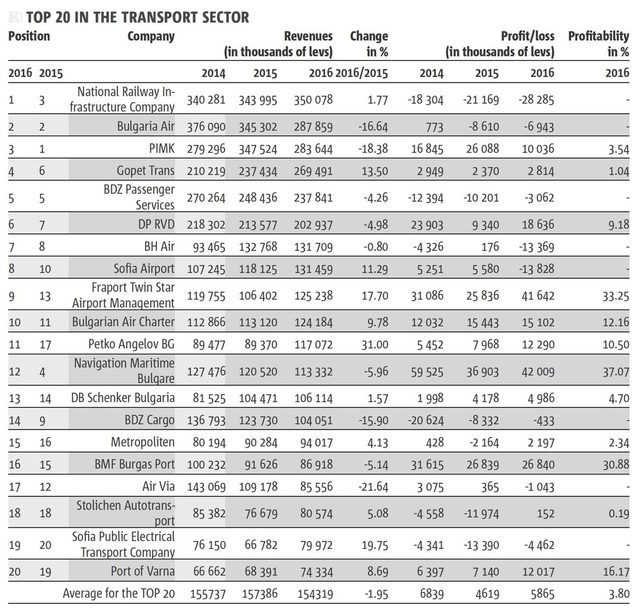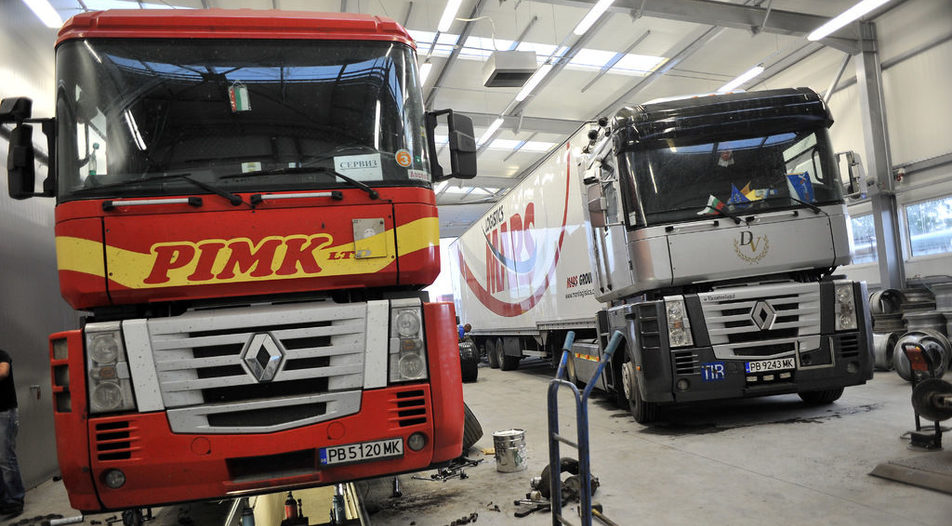After several years during which private road and air carriers held leading positions in the transport sector, in 2016 a state-owned company topped the ranking again. This was the National Railway Infrastructure Company (NRIC) with revenues of 350 million levs. However, the company's loss has been growing by the year and has already reached 28.2 million levs.
NRIC assumed a leading position partly due to the deteriorated international environment for the Bulgarian road carriers, which face increasing difficulties in the provision of haulage services in Europe. A number of Western European countries have started introducing protectionist measures, which pose restrictions before carriers from Eastern Europe.
"Every month a legal framework is set up somewhere," comments Penko Nestorov, one of the two owners of PIMK. An example in this respect are the requirements for minimum payment of drivers irrespective of the place of registration of the company employing them. It all started in Germany and other countries followed suit. Carriers say that France, Belgium, Austria and Germany have already introduced a requirement that says drivers shall not sleep in the truck's cabin during their periods of rest.
At the same time, the situation in Turkey has become quite unpredictable, which cannot but affect the country's economy. Carriers comment that there is an imbalance between imports and exports, which dents the profitability of haulages.
The shortage of international drivers is also a major problem of carriers and the sector has been alerted to it for a long time. Irrespective of the high remuneration, comparable to the pay in information technologies sector, the profession remains unattractive or, alternatively, the staff trained in Bulgaria prefers to work for foreign companies. The predictions for this year and next are not good and the above problems appear to form a lasting trend.
Where are the drivers?
Having been the biggest road carrier in the country until recently, PIMK had grown steadily for several consecutive years. Last year, however, its revenues fell by 17% and the company stepped back 2 places from the leading position. The company attributes the retreat to the shortage of international drivers, which leads to dead time for the trucks. After a long-distance trip the driver is entitled to a certain period of rest at home and since there is no one to replace him the vehicle remains idled for some time. "There were available drivers before, while now 150-200 people take their rest at the same time," Penko Nestorov says.
Another reason for the decline in revenue was the low number of infrastructure projects implemented in Bulgaria last year, given that around 20% of the PIMK fleet consists of trucks for bulk cargo.
The company sees intermodal transport as a possibility to minimize the negative impact of these factors and compensate for the drop in the number of road haulage orders. Together with DB Schenker it started performing such carriages from Ruse to Austria and Germany. Recently, it invested in its own railway company, PIMK Rail, which has five engines, special-purpose wagons and a few containers for trial runs. In August, PIMK's subsidiary Terminali was granted a government concession contract to operate the intermodal terminal near Plovdiv."These haulages are expected to grow considerably in the next 3 years in view of the low basis," Nestorov says.
Things will not be easy because of poor infrastructure in Bulgaria and Romania which causes major delays. This was the reason for halting a joint train service of PIMK and DB Schenker. However, the company has said that if is awarded the concession contract for the Plovdiv terminal, it will opt for haulages to Austria and Germany via Serbia.
A somewhat side project of PIMK during last year was the company's participation in a procedure for the selection of a concessionaire for Plovdiv Airport in consortium with Thrace Economic Zone.
Flexible forwarding
Transport company Gopet Trans also stakes on intermodality. It has increased its revenues by 13.5%, climbing to the 4th place in the ranking of transport companies. It is also at the top among forwarding companies in terms of revenues. The company was set up in Kazichene, on the outskirts of Sofia, by Peter Petrov and his wife in 1995.
The company, which has striven to expand its portfolio of services, achieved its highest rate of revenue growth in the intermodal segment last year. With a 20% rise in revenue the intermodal business of Gopet Trans came in ahead of the overall revenue growth of the company. In 2014, Gopet Trans launched its first intermodal train connecting Stara Zagora with the Danube port of Ruse and the Romanian city of Curtici, at the country's western border. From the private terminal, Rail Port Arad, trains depart for Ghenk in Belgium and the United Kingdom. In 2015, intermodal services accounted for around 5% of the company's revenues.
The number of end points which intermodal services can reach by train has also been increased to include Northern France and Austria. Gopet Trans will start offering intermodal haulages in Poland as well.
Growth centred in Plovdiv
However, the Plovdiv-based company Petko Angelov BG marked the highest rate of revenue growth in the transport sector last year. Its owner, Petko Angelov, shuns media publicity regarding his business and his public appearances are rare. He launched his transport business as a sole trader in 1990. His business expanded in 1999 when the company had already oriented itself towards freight transport from and to Europe. At present the company has 510 trucks.
As the number of customers and orders increased, the business grew. Petko Angelov BG carries freight inside Europe as well as from Europe to Turkey and back. Its main customers are forwarding companies from Turkey, Spain and Austria.
Money-box leader
The leaders in the ranking do not display such highly dynamic development and while reporting big turnovers, they struggle with a number of difficulties. The National Railway Infrastructure Company widens its loss by the year although the state subsidizes its activity on an annual basis. The money goes for salaries and capital repairs. The NRIC is faced with persistent problems in co-financing of projects which it manages under the EU's Operational Programme Transport. Hristo Alexiev, minister of transport in the previous caretaker government and NRIC employee, said the company needs 30-40 million levs in addition to the annual 105 million levs provided by the state for capital repairs.
The skies are not clear for the country's flag carrier, Bulgaria Air, either. It continued to reduce its revenues in 2016 for yet another year. The company encounters increasingly stiff competition from low-cost companies as Ryanair also started offering flights from/to Sofia Airport as of last year. The Bulgarian air companies failed to take advantage of the big rise in passenger numbers at the country's international airports. Only Bulgarian Air Charter reported revenue growth.
In 2016, 9.179 million passengers passed through the country's international airports, the Bulgarian Airlines Association said. This makes an annual growth rate of 23%: 23.2% at Sofia Airport and 22.7% at the airports of Varna and Burgas. Fraport Twin Star Airport Management, the concessionaire of the two Black Sea airports, increased both its revenues and profits. State-owned Sofia Airport posted an increase of revenues but because of a write-off of a deposit with the failed Corporate Commercial Bank (KTB) in the amount of 25.5 million levs the company reported a loss of 13.8 million levs in spite of its good performance in terms of flights and passengers in 2016.
The revenues of the maritime carrier, Navigation Maritime Bulgare, have also been falling. Irrespective of the difficulties on the market, the company of brothers Kiril and Georgi Domouschiev can boast winning a court battle against the government's Privatization Agency. At the beginning of April 2017 the Arbitration Court with the Bulgarian Chamber of Commerce and Industry issued a judgement allowing a change in the privatization contract with NMB that reduces the tonnage of ships which the company is required to maintain, thus helping the ship owners avoid the payment of over 50 million levs in penalties.

After several years during which private road and air carriers held leading positions in the transport sector, in 2016 a state-owned company topped the ranking again. This was the National Railway Infrastructure Company (NRIC) with revenues of 350 million levs. However, the company's loss has been growing by the year and has already reached 28.2 million levs.
NRIC assumed a leading position partly due to the deteriorated international environment for the Bulgarian road carriers, which face increasing difficulties in the provision of haulage services in Europe. A number of Western European countries have started introducing protectionist measures, which pose restrictions before carriers from Eastern Europe.












